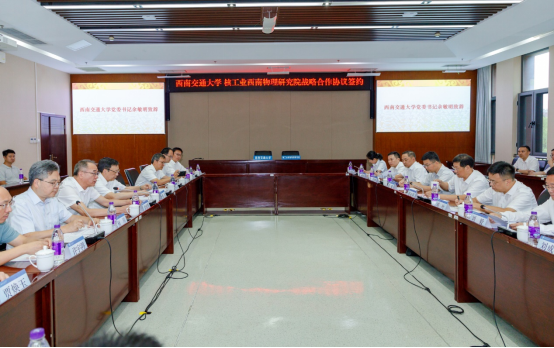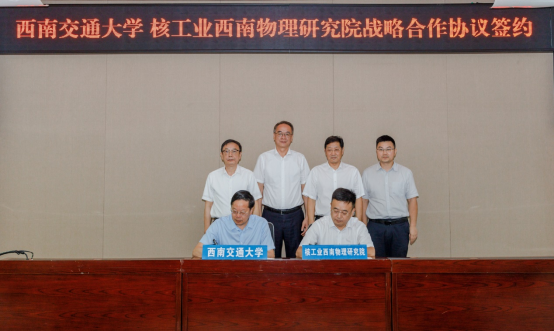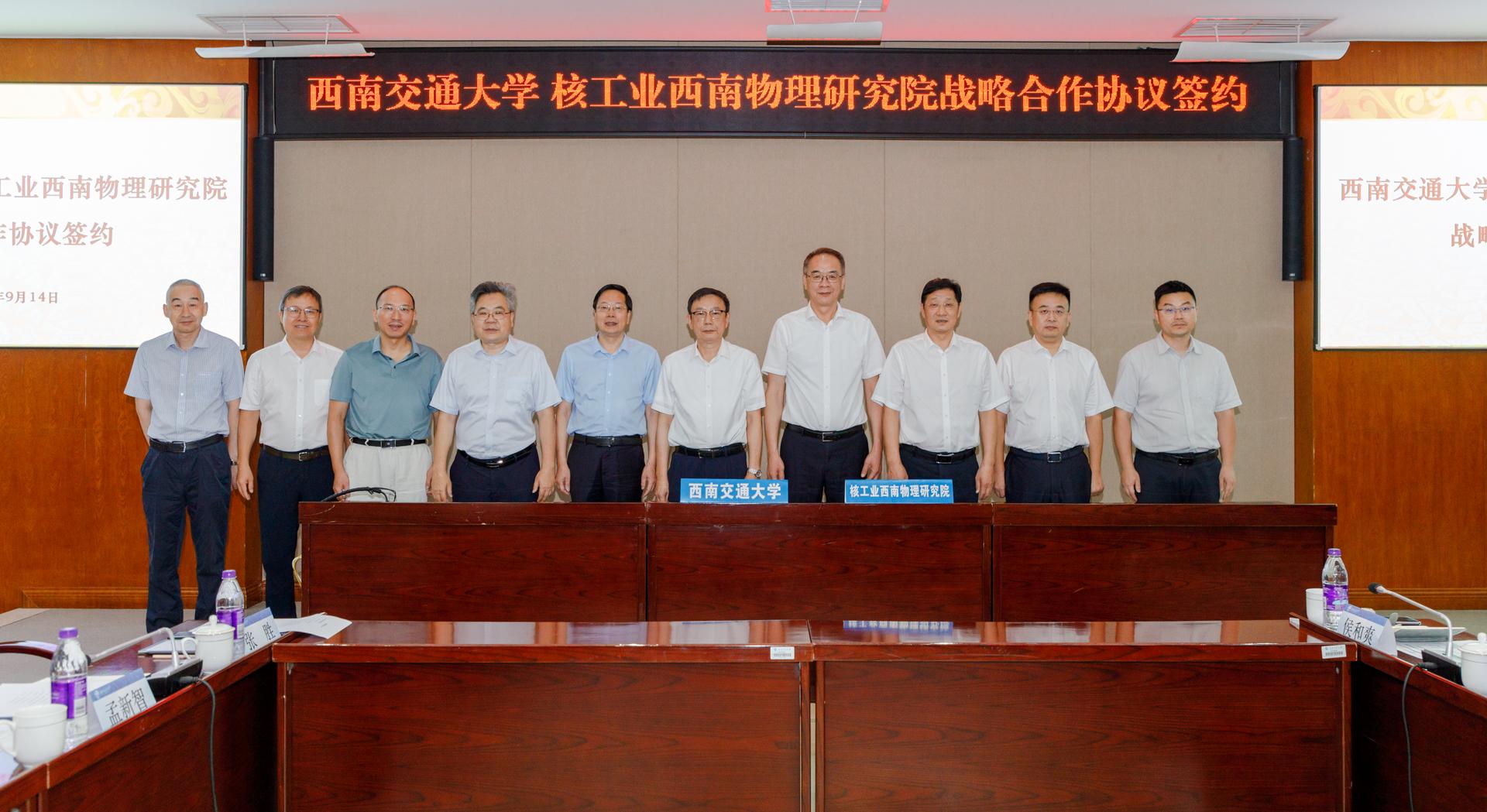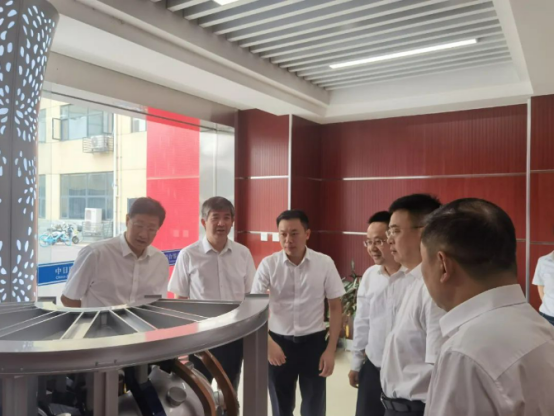On September 14th, Southwest Jiaotong University held a signing ceremony for a strategic cooperation agreement with the Southwest Institute of Physics, Nuclear Industry (referred to as SWIP), in the Meeting Room 272 of the Xipu Campus. This agreement aims to strengthen cooperation in the field of magnetic confinement nuclear fusion between the university and the institute. The ceremony was attended by Yu Minming, Secretary of the Party Committee of Southwest Jiaotong University, Yang Dan, President of the university, Shen Huoming, Vice President, Meng Xinzhi, Director of the Domestic Cooperation and Education Training Management Office, Liu Yu, Secretary of the Party Committee of the School of Physical Science and Technology, Jia Huanyu, Vice Dean (in charge of the work), Xue Yuhong, Director of the Fusion Science Research Institute, Zhang Sheng, Director of the Comprehensive Office of the National Laboratory for Rail Traffic (preparation), Zhu Zhiwu, Vice Dean of the Graduate School, Li Huailong, Vice Dean of the Institute of Science and Technology Development, Li Yinchuan, Director of the Project Department of the National Laboratory for Rail Traffic (preparation), Zhang Bixiang, Secretary of the Party Committee of SWIP, Liu Ye, President of SWIP, Xu Min, Chief Engineer of SWIP, Liu Yi, Director of the President's Office, Wang Quanming, Director of the Department of Science and Technology and Informationization, Liu Chenglin, Director of the Human Resources Department, Li Yongge, Secretary of the Party Committee of the Fusion Science Institute, Zhong Wulü, Director of the Fusion Science Institute, Hou Heshuang, Deputy Director of the Industrial Development Department, Ji Xiaoquan, Deputy Director of the Fusion Science Institute, and Fan Li, Deputy Director of the Planning and Development Department. The ceremony was presided over by He Chuan, Vice President of the university.

Yu Minming expressed sincere gratitude to SWIP for their strong support and assistance to the university's career development over the years. He pointed out that in recent years, the university and SWIP have cooperated in talent cultivation and fusion research, forging deep friendships. The signing of this strategic cooperation agreement marks a new historical height in their collaboration. Yu Minming hoped that both the university and SWIP would work together to shoulder the historic mission of building China's strategic scientific and technological strength in magnetic confinement nuclear fusion, accelerating the construction of a science and technology powerhouse, and making new and greater contributions to the great national rejuvenation and building a strong country.

Zhang Bixiang stated that as a major participating unit in the International Thermonuclear Experimental Reactor (ITER) project, SWIP has been working closely with fusion scientists from around the world, contributing Chinese wisdom and strength. He emphasized that the timing of signing the cooperation agreement with Southwest Jiaotong University is opportune. In the future, they will deepen their cooperation, jointly build research and development platforms, and continuously expand cooperation areas, establishing a normalized cooperation mechanism.

During the ceremony, in the presence of Yu Minming, Yang Dan, Zhang Bixiang, and Xu Min, Shen Huoming and Liu Ye signed the strategic cooperation agreement on behalf of both parties.According to the agreement, both parties will fully leverage their respective advantages and resources in the field of magnetic confinement nuclear fusion and plasma. They will innovate cooperation mechanisms in areas such as technological innovation, academic and technical exchange, platform construction, talent cultivation, and training, and enhance communication to promote the implementation of the agreement.Professor Xue Yuhong, Director of the Fusion Science Research Institute at Southwest Jiaotong University, introduced the research progress of the university's stellarator project, while President Liu Ye of SWIP presented the progress of SWIP's fusion research.
After the ceremony, Zhang Bixiang and Liu Ye from SWIP visited the Fusion Science Research Institute at the university to gain an in-depth understanding of the research progress and construction of the China’s First quasi-symmetric stellarator (CFQS) at the Fusion Science Research Institute. Relevant officials from both the university and SWIP attended the signing ceremony.

It is worth noting that the School of Physical Science and Technology has always focused on national major strategic needs, responded to national energy development, and actively promoted fusion research. The Fusion Science Research Institute focuses on basic research in magnetic confinement fusion and plasma physics, particularly in exploring and optimizing advanced magnetic field configurations in stellarators, researching magnetofluid instability physics in stellarators, and studying three-dimensional plasma transport physics. A series of significant achievements have been made in these cutting-edge theoretical research areas. The planning work for the CFQS laboratory in the Tianfu New Area has been fully initiated. Once completed, it will fill the research gap in China's stellarator-related fields, achieve a breakthrough from 0 to 1, enhance China's original innovation capabilities in controlled nuclear fusion, and cultivate more innovative talents while producing more original results.





